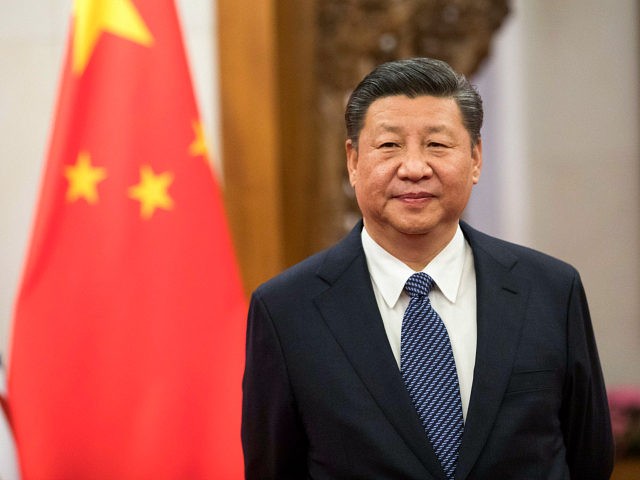China’s state-controlled Global Times newspaper lamented on Monday the persistence of “nationalist” distrust of the Communist Beijing regime throughout the rest of Asia, warning Chinese corporations to “delicately” assert themselves and their projects.
In a column titled “Chinese Firms Need Caution When Wading into Southeast Asia’s Nationalism,” the Global Times notes that the region has grown increasingly skeptical of Communist Party leader Xi Jinping’s “One Belt, One Road” (OBOR) infrastructure campaign, or the Belt and Road Initiative. OBOR is a plan to acquire contracts for Chinese companies to build roads, ports, and other key infrastructure all around the world, often indebting developing nations and resulting in China increasing its territorial control globally.
OBOR is especially threatening to Southeast Asia because it is home to the “Maritime Silk Road” – the South China Sea – where Beijing has spent years illegally building artificial islands in non-Chinese waters and equipping them with military assets, taking advantage of the inability of nations like Vietnam and the Philippines to take on the massive People’s Liberation Army (PLA).
American military leaders have warned that OBOR is a threat, even on the other side of the world. Speaking to the Senate Armed Services Committee in February, SOUTHCOM commander Adm. Kurt Tidd said the plan can “create commercial and security vulnerabilities for the United States, as do Chinese telecommunications and space ventures with dual-use potential, which could facilitate intelligence collection, compromise communication networks, and ultimately constrain our ability to work with our partners.”
“Five years on, the Belt and Road initiative has gained worldwide attention and interest,” the Global Times notes. “Southeast Asia, which sits atop China’s diplomacy objectives, expects to get urgently needed opportunities from the initiative that is committed to improving infrastructure and enhancing national and regional connectivity.”
Yet the newspaper laments that these opportunities have not done enough to convince some world leaders to blindly go along with the plan. “With their proximity to China, Southeast Asian nations have seen territorial disputes arising from time to time, as shown by historical tensions in the South China Sea,” it notes. “Meanwhile, as infrastructure projects involve a slew of crucial domestic issues such as funding and land acquisition, locals are naturally sensitive to the involvement of foreign companies.”
The article notes recent protests in Vietnam following the passage of a law that allowed 99-year territorial leases by foreign companies. In mid-June, thousands of Vietnamese protesters took the streets of its largest cities not only to protest the law, which applied to foreign companies from around the world but China specifically, suspecting that China would use the law to slowly expand its physical reach in the country.
“These entrenched challenges must be faced squarely and be handled delicately by Chinese companies in pushing forward Belt and Road projects,” the Global Times asserts, arguing that a “well-behaved Chinese company” can help to “significantly” convince those on the fence that China is a trustworthy global actor.
“It’ll take time for Southeast Asian people’s doubts and vigilance about China to die away. Even now, some politicians incite nationalism against China to win votes, which hampers Southeast Asia’s development and stops these countries from understanding the unselfish rise of China,” the newspaper concludes. “Both Southeast Asia and China have to leave history behind and embrace the present.”
Monday’s article is far from the first time that China has protested that fears of colonialism on the part of “nationalists” have hampered the expansion of OBOR. As recently as last week, the Global Times chided India’s ruling Bharatiya Janata Party (BJP) for warning that China’s territorial expansionism was a threat to the country.
“When it comes to diplomacy, BJP ideology is nationalist in nature as reflected through New Delhi’s constant disputes with Pakistan and its attempt to disrupt development of the China-led Belt and Road initiative in South Asia and the Indian Ocean,” the newspaper protested. “However, nationalism is a mixed blessing. Today’s Hindu nationalism has turned into a narrow-minded, conservative and highly exclusive mindset.”
Conversely, China has attempted to expand the influence of the project by inviting traditional rival nations like Japan and the United States to allow China to build on its territory. “The Belt and Road initiative can boost Sino-U.S. relations and better Asia-Pacific infrastructure will generate more space for trade,” the Global Times suggested in October. “Asia will need up to $26 trillion for infrastructure in the next 15 years – a lucrative market for U.S. companies such as Bechtel Corporation, Halliburton and Caterpillar Inc.”

COMMENTS
Please let us know if you're having issues with commenting.